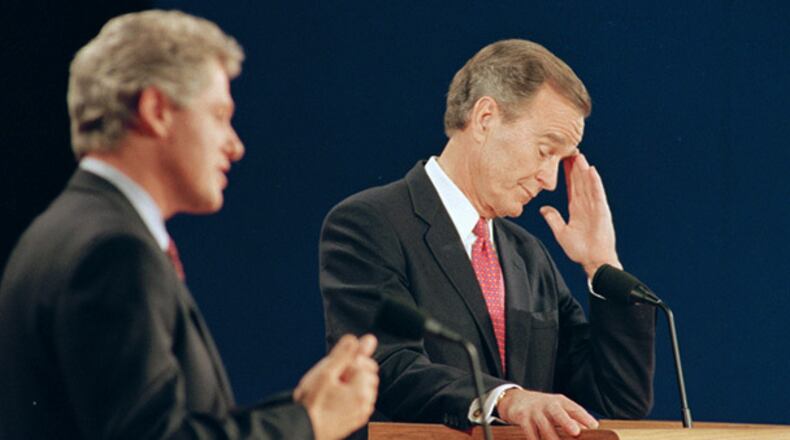I keep seeing suggestions that the 2016 presidential field has already been set, that we are doomed to a classic clash of the dynasties between Jeb Bush and Hillary Clinton, a rematch of sorts from the initial Bush vs. Clinton bout of 24 years ago.
Me? I'm not buying it. And I've asked Cher to express that a bit more forcefully:
Let's talk about the Democrats first. If her fellow party members are looking at Hillary Clinton with some doubt and trepidation at the moment, well, they probably should. Everybody knew going into this race that a high level of drama could be expected in any Clinton endeavor, and this time has already proved no different. Missing emails, half-million-dollar speaking fees, an imperious attitude toward the press. We've all seen this movie before, and it goes something like this:
But look, absent some earth-shaking development, Clinton will be the Democratic candidate. Bumpy night or not, no little understudy is going to be allowed to steal her starring role this time. Unlike Barack Obama in '08, Bernie Sanders and Martin O'Malley pose no threat and in fact are doing Clinton a major favor with their candidacies. They will force her to hone her sales pitch and prepare for debates, and for a while will also make her look like something other than what she is, which is the party's pre-ordained selection.
It's the other side of the fight card that causes me doubt.
I'm not by any means saying that Jeb can't win the GOP nod. He can. I'm saying that he's far from inevitable, that he's not even the favorite, and that he's one of a group of three, maybe four people who could win it. And a major part of the reason I say that is the mood of the GOP base:
After eight years of frustration at the hands of Barack Obama, they ARE mad as hell. They don't want to take it any more, and they're searching for a nominee who will vent that anger and frustration on their behalf. And while Bush has his strengths, he just isn't that man and that isn't his style. It was bad enough watching Romney trying to be something he wasn't; watching Bush try to be an attack dog would be like watching five-foot-six Tom Cruise trying to play six-foot-five Jack Reacher.
The counter to that argument is of course history. Cycle after cycle, Republican primary voters flirt early and often with the bad boys, the tough talkers, the flingers of red meat. But in the end, they always end up marrying the mama's boy, the establishment's designated "safe pick". Last time Mitt Romney was the mama's boy. Before that it was John McCain, George W., Bob Dole, George H.W. ...
And this year, of course, it's Jeb.
But let's take a closer look back at the 2012 race. That year, Republican primary voters also really really really wanted someone other than Romney as their nominee. That was the underlying story line throughout that whole, long, drawn-out process. The base was so desperate for a red-meat anti-Romney that the likes of Newt Gingrich, Rick Santorum and even Herman Cain had their days as frontrunner, until each of them collapsed under the weight of their own implausibility.
Yes, in the end, Republicans did accept Romney. But they did so only because the significant anti-Romney sentiment had no one credible to rally around. Their anguish was almost palpable:
They had nowhere else to go. This time they do. In addition to Bush, they have Marco Rubio, Scott Walker and maybe John Kasich. Each has weaknesses; each could falter in the long marathon ahead. But for the moment at least, each is a plausible major-party candidate. Each could be an alternative to a third Bush, a Bush who challenges the party line on immigration, on Common Core, a Bush who brings back memories that many in the party don't appreciate. Each could become the anti-Bush, while with Romney there was no alternative.
Process is also part of my doubt. In 2012, the drawn-out nominating process clearly favored Romney. He alone had the money and the organization to sustain himself through the death march toward the convention. Over time, he ploddingly wore down his opponents, and he also wore down those elements in the GOP base that had initially wanted to reject him.
Bush will have a similar money advantage. Even before announcing his candidacy, he is tapping donors and building a supposedly "independent" SuperPAC that already boasts a $100 million warchest. He hasn't been in the least bit shy about working the phones, calling people up, asking for help.
This time, though, the nominating process has been truncated by GOP officials, with the goal of having a nominee selected long before the July convention. Among other things, the shorter race makes Bush's money advantage a little less intimidating. His top rivals should have sufficient funds to stay afloat through that process. And as lesser candidates drop out, I'm guessing that Bush won't be their supporters' second choice.
The emergence of the so-called SEC primary, with Georgia and six other Southern states all holding their primaries on March 1, 2016, also complicates matters.
As Georgia Secretary of State Brian Kemp put it, “It is now clear that the road to the White House runs through the South." And I'm not sure the deeply conservative South is where Bush would make his stand, given the choice.
Nonetheless, in the critical two weeks between Feb. 23 and March 8, 11 southern states are scheduled to hold primaries. In some ways, that geographically scattered, chronologically compressed schedule favors somebody like Bush, who will have the money to be up with campaign ads in every state. But it's ideologically dangerous terrain, and it raises the odds of a candidate catching fire quickly -- perhaps off a great debate performance -- and seizing momentum that can't be stopped.
And you know what happens next:
About the Author
Keep Reading
The Latest
Featured


